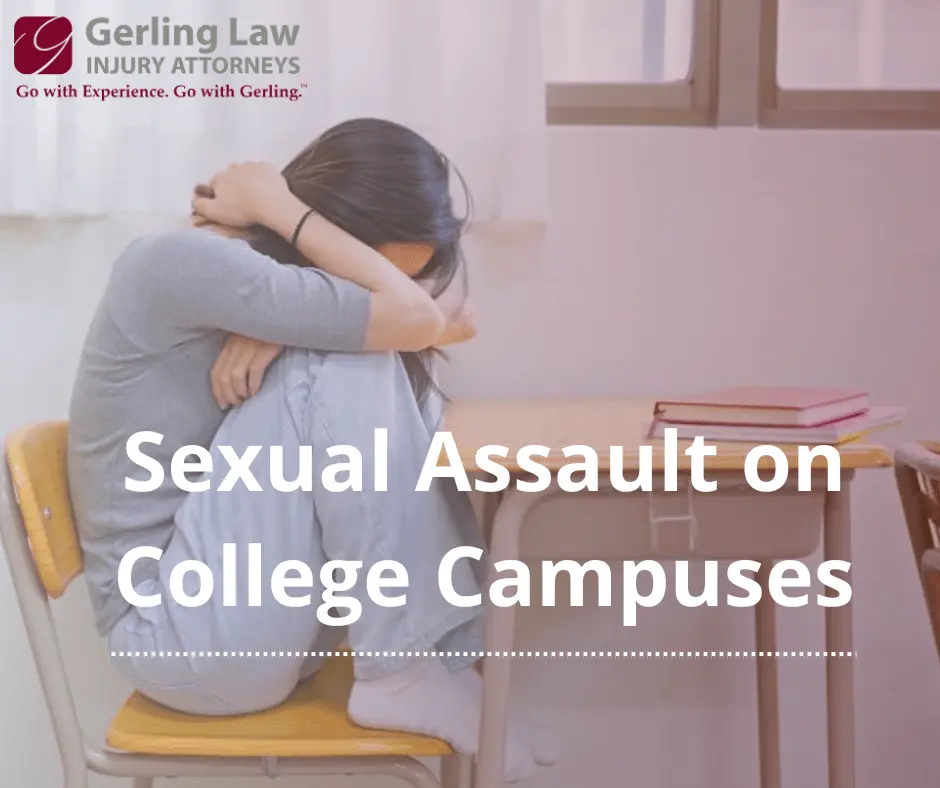
According to the Rape, Abuse, and Incest National Network, RAINN, 26.4% of female and 6.8% of male undergraduate students experience rape or sexual assault through physical force, violence, or incapacitation. The prevalence of sexual assault on college campuses is disheartening and scary. Sadly, it can happen to anyone. If you or a loved one was sexually assaulted on campus, you should know there are rights and options available to hold the perpetrator, and possibly the university, responsible.A college sexual assault lawsuit can be complex and challenging, but it is not impossible. With the right advocates, you can seek the justice you deserve.
Can a College Be Liable for Sexual Assault?
Under certain circumstances, a college or university can be held liable for sexual assault on its campus.
Generally, if the school’s negligence contributed to the sexual assault or it knew or should have known about certain conduct, it can be held liable.
Examples of situations where liability may extend to a university include:
- If the university fails to adequately ensure student safety and security,
- If the university fails to take remedial action when notified that a school-sponsored organization engages in deviant behavior and sexual assault,
- If the school fails to take necessary action after being told a student is being assaulted or harassed,
- If the school hires professors or other staff with known sexual assault convictions, and
- If the university allows a student with a known history of sexual assault to reside on campus or participate in certain university activities.
This is not an all-inclusive list, and many scenarios can give rise to institutional liability. If you are a survivor of campus sexual assault and believe the university is partially responsible, speak with one of our experienced lawyers immediately.
University Liability for Sexual Assault
You might be wondering why a university can be held responsible for sexual assault. While the university will not always be responsible for a crime committed on its campus, it can be culpable in certain situations where it failed to protect its students, faculty, and staff under Title IX and the Clery Act.
Title IX
Title IX is a federal law that prohibits gender discrimination in any educational institute that receives federal funding. Since all colleges receive some type of federal funding in the form of scholarships, grants, or other funding, they are subject to Title IX regulations. The courts have interpreted sex-based discrimination to include sexual assault and harassment under Title IX. Specifically, colleges or universities must take measures to foster an educational environment free from sexual assault and harassment. They must have adequate systems to prevent abuse, deter a climate that allows it, and provide a means for survivors to seek the help they need. Universities are required to establish a procedure for reporting and handling complaints of sexual violence, discrimination, and harassment.
Title IX also ensures survivors are not retaliated or discriminated against for reporting the assault or harassment. Survivors should not fear retaliation for reporting crimes. For instance, if a survivor reports the assault or harassment to the university and then faces discrimination, the university could be liable for violating Title IX.
The Clery Act
The Clery Act requires colleges and universities to disclose information about crime, including sexual assault, on and around their campuses.
They must maintain public crime logs, issue timely warnings about threats to students and facilities, warn about crimes that occurred in the area and pose a potential danger, and issue annual security reports. The Clery Act also requires universities to provide sexual assault survivors with certain rights, resources, and protective measures.
If a university or college fails to comply with Title IX or the Clery Act, it can be held liable for the sexual assault.
Proactive Safety Measures on Campus
Universities should have adequate and efficient safety measures to prevent sexual assault. Proactive measures universities should take include:
- Ensuring sufficient lighting for paths, stairwells, and hallways;
- Installing alarms or alert systems in potentially high-risk areas on campus;
- Having ample security guards and personnel on campus;
- Installing emergency phones on campus; and
- Providing educational resources for students and faculty.
No amount of prevention will fully eradicate sexual assault, but universities can significantly reduce the prevalence of sexual assault on campus using a proactive approach. Even with safety measures in place, institutions may still be liable for what occurred. An experienced attorney can help you thoroughly review your case.
Attorneys Representing Survivors of Sexual Assault on College Campuses
At Gerling Law, we are here to listen and advocate for you. If you or someone you love survived a college campus sexual assault attack, let us fight for you. With over 50 years of experience, we will stop at nothing to help you pursue the justice you deserve. Contact us today.

